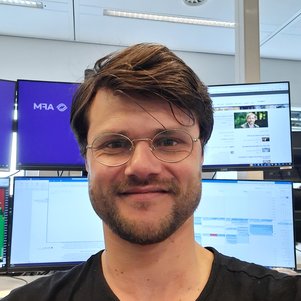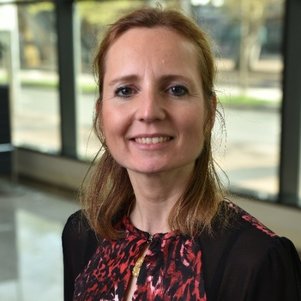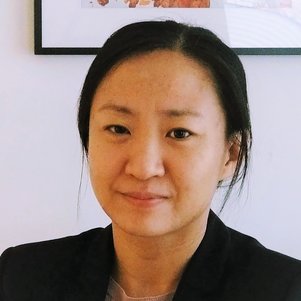Speakers
07 september 2022 16:24 | Zet in mijn agenda

Harold de Boer
Beware of the quants
Harold de Boer (Nijeveen, 1966) started his career in 1989 on a research project within a commodity trading firm. That research project would become Transtrend B.V., a leading systematic investment manager based in Rotterdam, specialized in trend-based trading. As one of Transtrend’s two managing directors, Harold is responsible for R&D, portfolio management and trading.
Transtrend’s Diversified Trend Program — with a track record going back to 1992 — is essentially based on applying technical analysis. Back in the 90s, technical analysis was met with great skepticism. A person working in an investment bank could even get fired if caught applying it.
In only three decades this stance has completely reversed. Applying quant strategies is nowadays perceived as the quintessence of investing. One could argue whether this U-turn is completely justified. An investment decision based on applying machine learning isn’t fundamentally different from an investment decision based on recognizing a head-and-shoulder pattern.
One thing is clear: applying quantitative techniques hasn’t helped us in the financial industry to prevent crises. We should consider the Global Financial Crisis to be a stain on our curriculum vitae. Maybe we weren’t responsible for the initial chain of choices that led to the crisis, but we did contribute to its expansion as willing executioners.
Are we willing to fulfill such a role again? We are most certainly capable enough. Since 2008, the power of the techniques available to us has only grown. And so has their potential impact on society. This has amplified our ability to do harm as well as good. It’s up to us.

Paul Embrechts
Risk Revealed: Cautionary Tales, Understanding and Communication
The title of my talk refers to a forthcoming book, to be published by Cambridge University Press, co-authored with Valérie Chavez-Demoulin (Lausanne) and Marius Hofert (Waterloo/Hong Kong University). Extreme Value Theory (EVT) offers a mathematical tool for the modeling of so-called What-If events, or stress scenarios. I will present several examples of risk-based decision-making and show how EVT can be used as part of the solution. The current pandemic has clearly shown that the communication of scientific evidence has a difficult stand in the ubiquitous environment of social media. I will discuss some examples of this struggle.
From 1989 till 2018, Paul Embrechts was Professor of (Insurance) Mathematics at ETH Zurich. Since August 2018, he is emeritus Professor. He holds an Honorary Doctorate from the Universities of Waterloo, Heriot-Watt, Louvain, and City, the University of London. He co-founded RiskLab (https://risklab.ethz.ch/) in 1994 and ETH's Risk Center (https://riskcenter.ethz.ch/) in 2011. Dr Embrechts has published extensively in the fields of probability and statistics, mainly with applications to insurance and finance. He co-authored the influential books "Modelling Extremal Events for Insurance and Finance", Springer, 1997, and "Quantitative Risk Management: Concepts, Techniques and Tools", Princeton University Press, 2005/2015. Later this year a new book "Risk Revealed: Cautionary Tales, Understanding and Communication" will appear with Cambridge University Press.
Recent developments in quantitative research and modelling in the financial industry
The banking industry: struggling with restricted and detailed regulations (ECB Guide on Internal Models; CRR and CRR2); exploring machine learning methods in credit risk modelling, anomaly detection, etc.. - Financial market (bonds, stocks, FX and derivatives): machine-learning based prediction models; an arising need to model the maximum draw down for the purpose of risk management - FinTech field: alternative credit scoring models
Dr. Fang Fang is the director of FF Quant, a small technical consulting firm serving the financial industry, and a part-time assistant professor of the Numerical Analysis group of Applied Math department in TU Delft.
She obtained a PhD in Computational Finance from TU Delft, based on the innovation of “the COS method”. Since 2009 she has been working as a Quant, focusing on pricing model validation and risk model development, at Tier-1 financial institutions in the Netherlands. In recent years she has also been involved in versatile time series statistics and/or data engineering model developments, such as pattern recognition, market prediction, data backfilling, etc. using both econometrics and machine learning methods.
Her research interest lies in improving numerical methods and models for 1) risk quantification and allocation, 2) derivative pricing and 3) time series predictions. Courses she teaches/moderates include Computational Finance (Msc), Advanced Credit Risk Management (MOOC course joint prepared by TU Delft and Deliotte) and Introduction of Credit Risk Management (MOOC by TU Delft).

Fenghui Yu
Optimal Pairs Trading: Dynamic Mean-Variance Strategies
Pairs trading is a market-neutral investment strategy and has been widely used by traders and hedge funds. In this talk , I will present the optimal pairs trading strategies under symmetric and non-symmetric trading constraints. Under the assumption that the price spread of a pair of correlated securities follows a mean-reverting Ornstein-Uhlenbeck process, analytical trading strategies are obtained under a mean-variance framework. Model estimation and empirical studies on trading strategies have been conducted using data on pairs of stocks and futures traded on securities market. These results indicate that our pairs trading strategies have fairly good performance.
Dr. Fenghui Yu joined the Delft Institute of Applied Mathematics, TU Delft as a tenure-track assistant professor in Financial Stochastics in August 2022. Before joining TU Delft, she spent 3 years as a postdoctoral researcher at RiskLab and Department of Mathematics of ETH Zurich. She was also a postdoctoral fellow at the Department of Mathematics of the University of Hong Kong for a few months where she did research at the Advanced Modeling and Applied Computing Laboratory. Dr. Yu obtained her PhD degree in Financial Mathematics from the University of Hong Kong in December 2018.
Dr. Yu’s research interests lie in the areas of mathematical finance and insurance, operations research, applied probability and data science. She is particularly interested in stochastic modeling and optimization, optimal stochastic control, dependence modeling, asset allocation, derivative pricing and hedging, risk management, machine learning and data-driven methods and their applications in finance, actuarial science and risk management. Dr. Yu has been actively collaborating in various aspects of optimal pairs trading strategies, optimal convergence trading strategies, interacting contagious credit risk modeling, and credit derivatives pricing and hedging, etc. Her research involves both theoretical analysis and development of tailor-made financial models.

Kees de Graaf
Challenges in Modern Asset Liability Management
This lecture consists of 2 parts: a theoretical part and a practical part.
In the first part we will present some current quantitative challenges in asset management. More specifically, we will elaborate on model development for mortgage funds and show how we use quantitative strategies (like momentum, value and carry) at Aegon Asset Management.
Next to that we will discuss how a proper understanding of fundamental aspects from measure theoretic probability help during asset and liability management. In particular we will elaborate on switching between risk neutral and real world probability measures and the challenges this presents.
In the second part of the lecture we will focus on the practicalities of hedging the interest rate risk of a string of pension fund liabilities. We will show that the classical Black-Scholes assumptions do not hold in practice. We will talk about the goal of ALM hedging, what financial instruments are used and how do they work.
Dr. Kees de Graaf works as a quant in Aegon Asset management since 2018. In his previous role he worked as a quant on (risk neutral and real world) scenarios in Ortec Finance. He obtained his PhD in Computational Science from the University of Amsterdam in which he focused on numerical techniques for derivative valuation including credit valuation adjustments. His work includes publications in leading journals as Quantitative Finance and the Journal of Computational Finance.

Paul Gruntjes
Dr. Paul Gruntjes (1981 Gemert (NB), Netherlands) holds a PhD in Mathematical and Computational Finance from the University of Amsterdam (UvA). His research interests include mathematical finance in the broadest sense of the word; especially practical applications of mathematics to financial problems. As a former academic he started his professional career as a quant at Cardano Risk Management. After a period working in high frequency trading (Flow Traders) he currently works as a Senior Portfolio Manager & Trader in the Derivatives and Hedging (D&H) Team of Aegon Asset Management. In this role he is co-responsible for the hedging of the guarantee programs of the insurer of Aegon (Aegon NL) and the execution of OTC derivatives within the wider Aegon Asset Management organization.

Mark Pooters
The systemic risk aspect of market liquidity for investment funds and the usefulness of agent based market simulations
- The AFM is engaged in a partnership with the British Alan Turing Institute.
- One of the aims of the partnership is to develop an agent-based market simulator that can be used to test policy hypotheses.
- The reason being: In spite of regulator’s efforts, it remains difficult to quantity the effect of any agent on the market (for example: on liquidity, volatility, etc.).
- The AFM believes this is partially because our current models don’t sufficiently account for the interaction between agents.
- Yet such interactions might be crucial for understanding financial stability and market manipulation.
- In this presentation the AFM shows our work on the market simulator and how it could be applied.
- One relevant application of market simulations is in the context of policy discussion on financial stability, specifically related to market liquidity.
Mark is a Supervision Officer in the Financial Stability team at the Dutch Authority for the Financial Markets (AFM). His main focus is on the financial stability aspects of the investment fund sector and as such is involved in international policy making around that subject. Mark is currently the chair of the policy task force of the Non-Bank Financial Intermediation Expert Group of the European Systemic Risk Board (ESRB) and he is a member of the Committee on Asset Management of the International Organization of Securities Commissions (IOSCO). Mark has a MSc International Economics and Business from the Utrecht University School of Economics.

Rob Graumans
Rob is a Data Scientist at the team Multi Asset Class Surveillance at the Dutch Authority for the Financial Markets (AFM). As such, his main focus is on writing market manipulation detection algorithms and investigating the effects of market participants on the Dutch financial markets. Rob is especially interested in algorithmic trading and machine learning, and collaborates with the British Alan Turing Institute in researching the effects of (algorithmic) trading agents. Rob has a BSc Business Administration and BSc Philosophy of Science from the University of Groningen, and a MSc Philosophy of Science from the London School of Economics and Political Science.

Liakos Papapoulos
The increasingly innovative use of market and ESG data within the Pension Fund community
Part I: Trading in financial markets has been evolving quickly during the last few years; where digitization and data centricity are becoming more widespread in global markets. Most large pension funds typically have to trade large quantities of securities in order to keep portfolio asset allocations and risk metrics in line with the investment mandates. At the same time we all face similar challenges, but also have similar investment beliefs. MN and PGGM decided to work together on historical market data analysis to improve their insight in the workings of foreign exchange markets. In order to be aligned with the latest quantitative research methods, we also reached out to the academic community by launching our joint Academic Excellence Program. During this session we will be sharing our experiences of working together on this challenging topic.
Part II: With heightened demand for environmental, social, and governance (ESG) investing, regulators and investors are clamoring for increased transparency that requires more and better data on the environmental and societal implications of investments. In this talk we provide an overview of how investments can be evaluated against ESG criteria, what data sources can be used, and what challenges ESG data presents for investors.
Liakos is a Senior Investment Manager within the Treasury department of MN with a focus on Foreign Exchange Trading and Portfolio Management. He has been with MN for more than nine years and has developed a strong focus for Tech, Data and Innovation, working closely with MN’s Innovation Lab (the MLab). He holds a M.Sc. in International Economics from the Erasmus University in Rotterdam and is a CFA Charterholder.

Mariska Douwens - Zonneveld
Mariska is Head of Equities within MN, a team which executes index replication mandates, listed real estate mandates and an active ESG mandate. Prior to this function, Mariska occupied positions as Credit Investment Strategist on Credits at PGGM with a focus on carbon reduction strategies, as a cross-asset investment strategist at MN and Fund manager Credits. She started her financial career as a sell-side equity analyst. She holds a Ph.D. in Behavioral Finance from Erasmus University Rotterdam (Netherlands), a postgraduate degree in Financial Analysis (RBA) and a M.Sc. in Business Economics (Vrije Universiteit).

Michael Kurz
Michael is a Fund Manager in MN’s Equities department with a focus on portfolio management for the North America and Europe index replication mandates as well as research. Prior to joining MN, Michael was a Senior Advisor in the Responsible Investments team at PGGM and a Financial Risk Manager at the Dutch Central Bank (De Nederlandsche Bank). He holds a Ph.D. in Finance from Maastricht University (Netherlands), a M.Sc. in Economics and Finance from University of Tübingen (Germany), and a B.Sc. in Economics and Business Administration from Hohenheim University (Germany).

Antonis Papapantoleon
Model-free and data driven methods in mathematical finance
Academics, practitioners and regulators have understood that the classical paradigm in mathematical finance, where all computations are based on a single "correct" model, is flawed. Model-free methods, were computations are based on a variety of models, offer an alternative. More recently, these methods are driven by information available in financial markets. In this talk, we will discuss model-free and data driven methods and bounds and present how ideas from probability, statistics, optimal transport and optimization can be applied in this field.
Antonis Papapantoleon is a Professor of Mathematical Finance at the Delft Institute of Applied Mathematics, EEMCS, TU Delft and a member of the Delft FinTech Field Lab. He is also an Affiliated Researcher at the Institute of Applied and Computational Mathematics, FORTH.
Before moving to Delft, he served as an Assistant Professor of Mathematics and Director of FEMO Lab at the School of Applied Mathematical and Physical Sciences, National Technical University of Athens. He also served as a Juniorprofessor at TU Berlin from 2011 until 2017, and as a Deputy Professor at the University of Mannheim for one semester in 2016–2017. He received his PhD in Mathematics from the University of Freiburg supervised by Ernst Eberlein, and was a post-doc at TU Vienna in the group of Josef Teichmann. His practical experience includes positions at Commerzbank and at the Quantitative Products Laboratory, a joint venture between Deutsche Bank, HU Berlin and TU Berlin.
His research interests range from limit theorems for stochastic systems to the applications of Lévy processes in finance, term structure and LIBOR modeling, systemic risk measurement and management, and model-free methods in finance. His research has been published in leading journals of mathematics and mathematical finance, such as Mathematical Finance, Mathematics of Operations Research, Management Science, Insurance: Mathematics and Economics, and the Transactions of the AMS, while he has co-edited a book on Advanced Modelling in Mathematical Finance (Springer, 2016).
His research has been funded by public funding bodies such as the Hellenic Foundation for Research and Innovation, the Europlace Institute of Finance, the DAAD and MATHEON, as well as by private corporations. He has also delivered several invited talks at conferences and seminars around the world.
